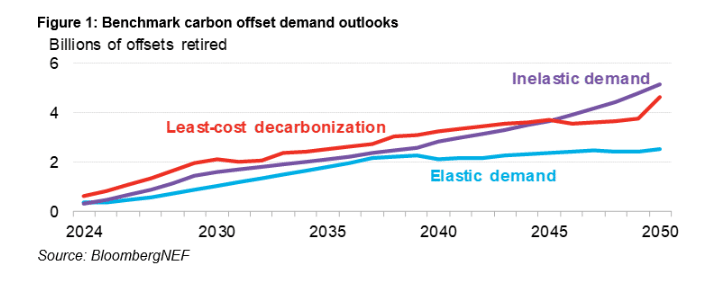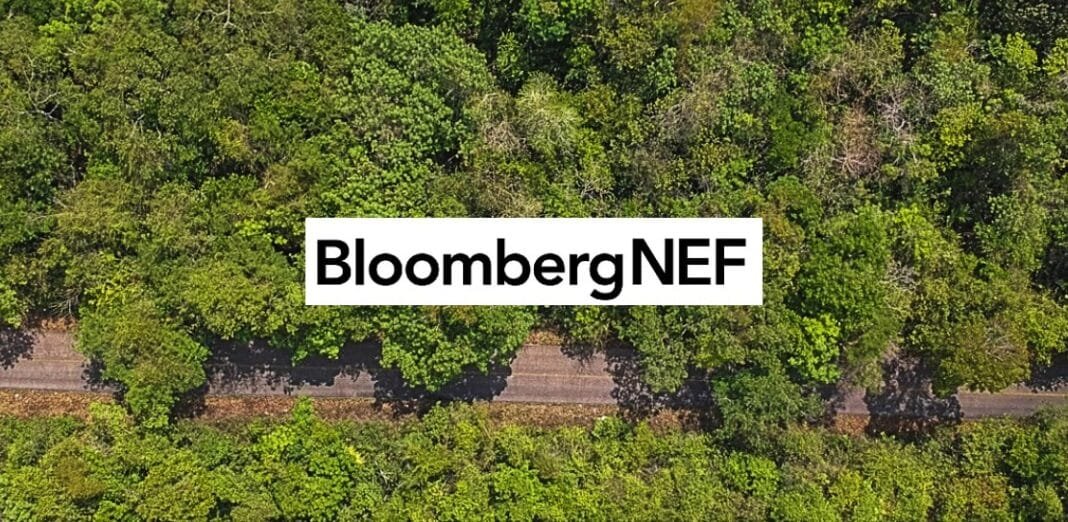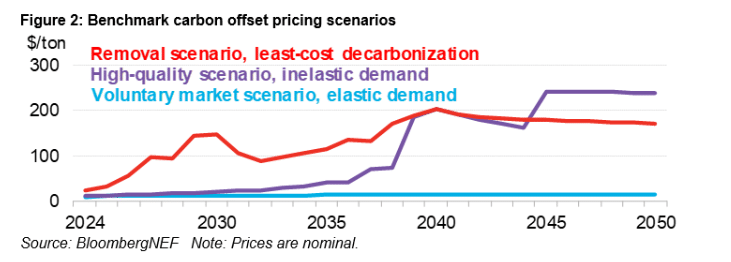The voluntary carbon market (VCM) faced significant challenges in 2023, leading to ongoing scrutiny and reputational issues. The year 2024 would be pivotal for the market’s future, with confidence in carbon credits playing a decisive role.
BloombergNEF’s (BNEF) Long-Term Carbon Offsets Outlook 2024 report suggests that restoring trust could drive companies to purchase billions of carbon credits annually. This could potentially elevate prices to $238 per ton and bring market value at over $1.1 trillion annually by 2050.
However, failure to restore confidence could lead to the demise of the broader market.
Make or Break: Charting the Course for Carbon Credits
According to BNEF, demand is the crucial variable determining the fate of the voluntary carbon market. Despite setting a new annual demand record in 2023, the increase was only marginal compared to previous years.
In fact, that record indicates a market heavily oversupplied by nearly 50%.
Many companies have shown elastic demand and abandoned offsets due to fear of criticism and rising carbon prices. If this elastic demand persists as prices rise, annual purchases could reach 1 billion offsets by 2030. Further down the road, demand could stabilize at 2.5 billion by 2050.

“But if buyers can’t trust the quality of the credits they’re buying and risk greenwashing accusations, then the market will never reach its potential. Credits will never be more than discretionary spend in this case.”
Recent initiatives like the Integrity Council on Voluntary Carbon Markets and guidance from regulators such as the US Commodities Futures Trading Commission are currently focused on bolstering trust in carbon credits.
Their success could establish carbon credits as a critical component of corporate decarbonization strategies, irrespective of their prices. This creates an inelastic demand.
This scenario could lead to companies purchasing 1.4 billion credits annually by 2030 and 5.9 billion by 2050.
BNEF Scenarios for Carbon Offset Valuation
Alternatively, the success of these initiatives could position carbon credits as a viable substitute for other forms of abatement. The key driver? Cost.
This least-cost decarbonization approach might stimulate the purchase of up to 1.6 billion credits in 2030 and 5.1 billion in 2050.
The BNEF report outlines 3 scenarios for future carbon offset prices. This price outlook is based on the market structure and demand dynamics.
In the ‘High-quality scenario’, integrity issues are resolved and demand is inelastic. Under this scenario, prices start low at $20/ton in 2030 but rise rapidly to $238/ton by 2050. It could potentially lead to a market value of $1.1 trillion annually.
In the ‘Voluntary market scenario’, integrity issues persist and demand is elastic. Thus, prices remain low at $13/ton in 2030 and reach only $14/ton by 2050. This scenario could fuel criticism of carbon credits as a “right to pollute,” with the market peaking at a value of $34 billion annually in 2050.
In the ‘Removal scenario’, companies focus on purchasing carbon removals and credits that are interchangeable with other forms of abatement. Carbon offset prices soar to $146/ton in 2030 and $172/ton in 2050. This last scenario results in a market value exceeding $884 billion annually by 2050.
The removal scenario is the least-cost scenario. It highlights the importance of addressing integrity issues in the VCM and maintaining strong demand.
Where the Fate of the VCM Hangs
However, the lack of progress at COP28 on Article 6 underscores the significance of the VCM, with the private sector working to position carbon credits as a complement to other decarbonization or carbon emission reduction measures. The success of these efforts could determine whether the private sector achieves its net zero targets.
Last year, the Voluntary Carbon Markets Integrity Initiative (VCMI) introduced additional guidance for its Claims Code of Practice. It helps companies in making claims about their use of high-quality carbon credits in their net zero strategies.
Recently, the ICVCM announced its plan to assess 100+ active carbon credit methodologies for adherence to the high-integrity Core Carbon Principles (CCPs).
- READ MORE: Carbon Prices and Voluntary Carbon Markets Faced Major Declines in 2023, What’s Next for 2024?
These developments are critical in shaping the voluntary carbon market landscape, particularly in addressing integrity, quality, and trust issues.
BNEF provides updates on its historical carbon offset supply and demand data every month and its long-term outlook every year.
The fate of the voluntary carbon market hangs in the balance, with trust and demand serving as linchpins for its future. As initiatives strive to bolster integrity and quality, the market faces a critical juncture that will determine its viability in the journey towards Net Zero.


